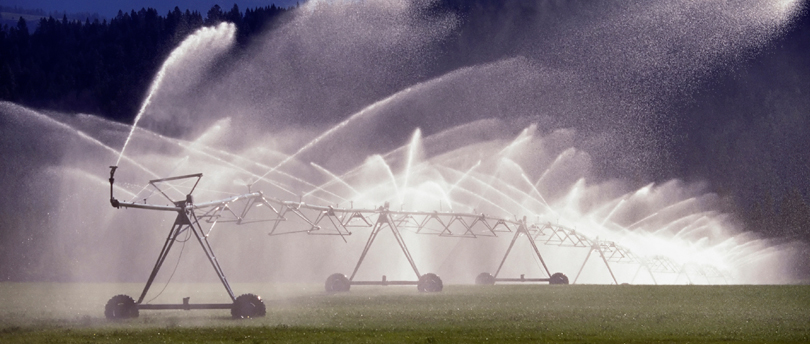Water footprint is the answer: what’s the question?
07/03/2016

If you ask someone over dinner, “did you know that 7,000 litres of the world’s water have been consumed to bring the beef steak to your plate, but only 42 litres to provide the potatoes?” the answer is usually accompanied by shock (and disbelief). This provides a useful launch-point for a discussion about the sustainability of our lifestyles, but often ends up with the question “so, should we stop eating meat”?
Unfortunately the over-simplistic messages of water volumes have been widely abused to justify or encourage changes in diet and lifestyles. To answer the question about the impacts of our diet on the world’s water we need to unpack the numbers and think about potential impacts.
Firstly, how much of the total volume of water is “green” water (that is, rain water used by plants at the point where the rain falls)? Most British and Irish beef, for example, is largely fed on grass and grains that have been grown using rainfall only. We can argue that this water has a very low opportunity cost. If we stopped raising animals on that land, something else would be growing there (whether another crop, forest or natural vegetation) that would use at least as much water as the grass did and it would not make a substantial difference to the amount of water available in the basin for domestic, industrial and environmental uses. Secondly, what is the potential impact of using “blue” water (that is, water withdrawn from rivers, lakes and aquifers) on the availability of water for other users in the basin? 1 m3 withdrawn from a place (or time of year) with plentiful water resources has a much lower potential impact than 1 m3 withdrawn from a place where freshwater resources are scarce.
The modern western diet is rich in its diversity with foods coming from all round the world and grown in different agricultural systems; these will all have different potential impacts on the water footprint. Recently, we looked at the potential impact of the UK diet on water scarcity (Hess, et al. 2015. Food Policy, 50: 1-10) using the approaches of ISO14046. In total, we estimated that 56.2 Gm3 of water is consumed each year to support the diet of the UK. That is equivalent to 2,400 litres per person per day. However, most of this is from rain-fed agriculture, and the “blue” water consumed in supporting the UK diet is only 160 litres per person per day – which by coincidence is almost the same as the average daily per capita water use in our homes.
So what uses the largest amount of water? Read the full version of this blog post can be found on the Food Climate Research Network…
Categories & Tags:
Leave a comment on this post:
You might also like…
Keren Tuv: My Cranfield experience studying Renewable Energy
Hello, my name is Keren, I am from London, UK, and I am studying Renewable Energy MSc. My journey to discovering Cranfield University began when I first decided to return to academia to pursue ...
3D Metal Manufacturing in space: A look into the future
David Rico Sierra, Research Fellow in Additive Manufacturing, was recently involved in an exciting project to manufacture parts using 3D printers in space. Here he reflects on his time working with Airbus in Toulouse… ...
A Legacy of Courage: From India to Britain, Three Generations Find Their Home
My story begins with my grandfather, who plucked up the courage to travel aboard at the age of 22 and start a new life in the UK. I don’t think he would have thought that ...
Cranfield to JLR: mastering mechatronics for a dream career
My name is Jerin Tom, and in 2023 I graduated from Cranfield with an MSc in Automotive Mechatronics. Originally from India, I've always been fascinated by the world of automobiles. Why Cranfield and the ...
Bringing the vision of advanced air mobility closer to reality
Experts at Cranfield University led by Professor Antonios Tsourdos, Head of the Autonomous and Cyber-Physical Systems Centre, are part of the Air Mobility Ecosystem Consortium (AMEC), which aims to demonstrate the commercial and operational ...
Using grey literature in your research: A short guide
As you research and write your thesis, you might come across, or be looking for, ‘grey literature’. This is quite simply material that is either unpublished, or published but not in a commercial form. Types ...






